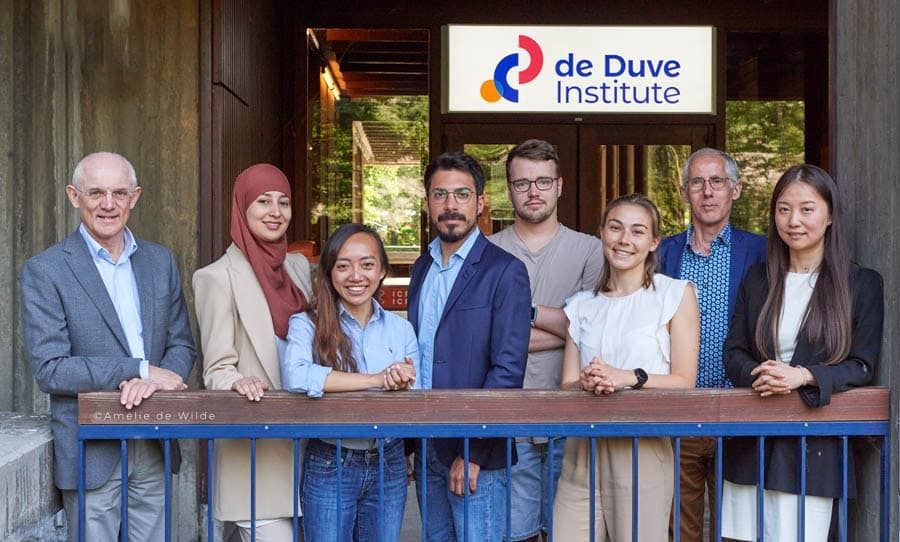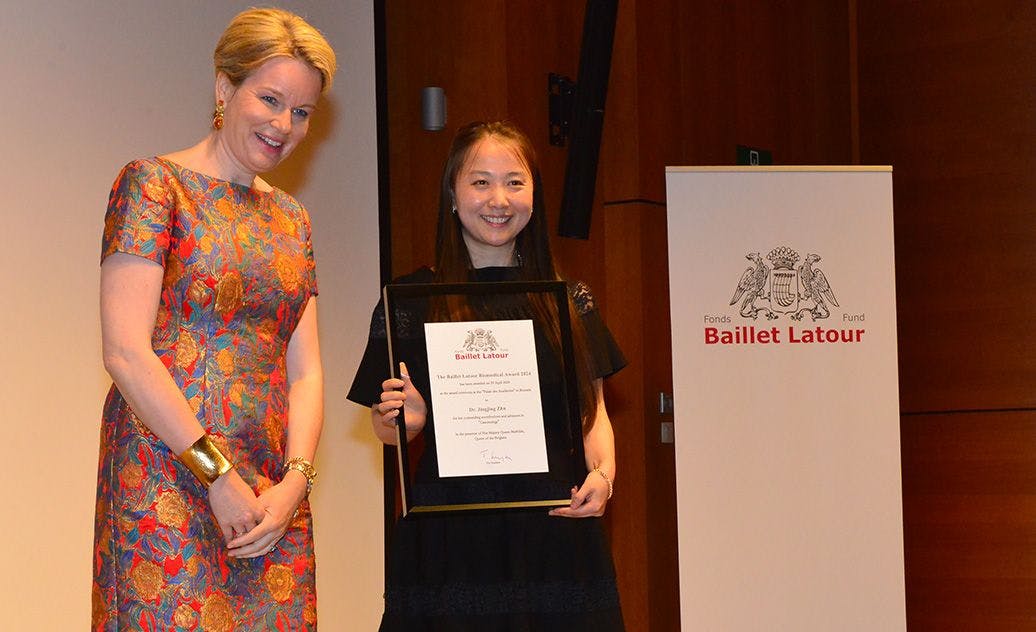
Jingjing Zhu
Institut de Duve Avenue Hippocrate 75 - B1.74.03 1200 Bruxelles
The Zhu lab focuses on pioneering advancements in tumor immunotherapy, including novel targets, improved delivery methods, and uncovering resistance mechanisms.
Major achievements
- Discovery of a New Tumor Immunotherapy Target: Discovered α2 adrenergic receptor as promising immunotherapy target, addressing PD-1 antibody non-responsiveness.
- Development of Enhanced Anti-Tumor Approach: Innovated CD8 T cell-based delivery of anti-PD-L1 nanobodies, improving tumor response while reducing side effects.
- Obtained new Immunotherapy Resistance Insight: Revealed lymphocyte apoptosis-driven resistance mechanism, offering potential to enhance anti-tumor immune response.
Recherche
Question
How can we enhance the effectiveness of tumor immunotherapy through the discovery of novel targets, innovative delivery techniques, and insights into resistance mechanisms?
Research focus

Cancer immunotherapy has progressed, extending survival for advanced patients. While clinical outcomes generate interest, benefits remain limited, necessitating further research for clarity.
Jingjing Zhu and her lab’s research revolves around cancer immunotherapy, delving into the intricacies of the tumor microenvironment and its profound impact on treatment outcomes. Through the application of cutting-edge techniques and diverse model systems, the team systematically explores immunosuppressive mechanisms, including T cell dysfunction and the influential effects of the tumor microenvironment. These insights serve as the foundation for pioneering novel immunotherapeutic strategies and identifying promising drug targets. The lab's accomplishments span significant breakthroughs, including the identification of critical pathways such as tumor-infiltrating T cell apoptosis initiated by Fas ligand. Notably, the lab's work has spotlighted the adrenergic receptor alpha-2 as a novel and potent target for anti-cancer therapy, an achievement underscored by a prominent publication in the journal Nature. Additionally, the lab is actively involved in a sustained endeavor to uncover genes pivotal to T cell dysfunction. The pursuit of precision in treatment is evident in the lab's innovative methodologies, exemplified by the development of targeted drug delivery strategies—such as the deployment of anti-PD L1 nanobodies via specialized anti-tumor CD8 T cells, yielding notable success in controlling tumors as demonstrated in a murine model. With unwavering confidence in the potential of anti-cancer immunotherapy, Jingjing and her team remains dedicated to unearthing novel mechanisms of immunomodulation and fostering collaborative ventures within the industrial landscape to drive transformative progress in the field.
Maladies
Bio
Jingjing Zhu obtained her PhD in Biomedicine from KULeuven in 2013, pioneering high-specificity nanobodies targeting furin for anti-cancer therapy. She then joined Prof. Benoit Van den Eynde's lab for her post-doc training, unraveling immunosuppressive mechanisms in cancer and enhancing immunotherapy. Notably, she discovered tumor-infiltrating T cell apoptosis due to Fas ligand, a key immune-suppressive mechanism (Nat Commun 2017, Cancer Immunol Immunother 2019). Since 2017, she became a Team leader within the lab unit of Benoit Van den Eynde focusing on innovative strategies and drug targets for clinical use. With her team, she identified poor anti-PD-L1 antibody tumor penetration as a limiting factor for the effectiveness of anti-PD-L1 treatment. The team developed a method for targeted delivery of anti-PD L1 nanobodies to the tumor site using specific anti-tumor CD8 T cells producing the anti-PD L1 nanobodies at the tumor site. This results in significantly better tumor control in a mouse model (Cancer Immunol Res 2022). The team recently published adrenergic receptor alpha-2 as an immunotherapeutic target in Nature (2023) with relevant patents. As a group leader at De Duve Institute, she continues groundbreaking research, aiming at advancing cancer immunotherapy and translating research into impactful clinical outcomes.
Honors
- Member of Belgium Immunology Society
Affiliations
- Group Leader, de Duve Institute
- UCLouvain
- Ludwig Institute for Cancer Research
Equipe
Postdoctoral Scientists
PhD Students
Research Assistant
Administrative Support
Tumour immune rejection triggered by activation of α2-adrenergic receptors
Zhu J, Naulaerts S, Boudhan L, Martin M, Gatto L & Van den Eynde BJ
Nature (2023) 618(7965): 607–615
T Cell-Mediated Targeted Delivery of Anti-PD-L1 Nanobody Overcomes Poor Antibody Penetration and Improves PD-L1 Blocking at the Tumor Site
Petit PF, Bombart R, Desimpel PH, Naulaerts S, Thouvenel L, Collet JF, Van den Eynde BJ & Zhu J
Cancer immunology research (2022) 10(6): 713–727





